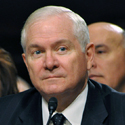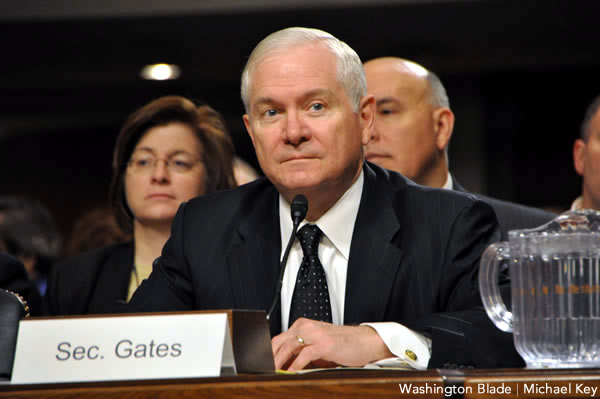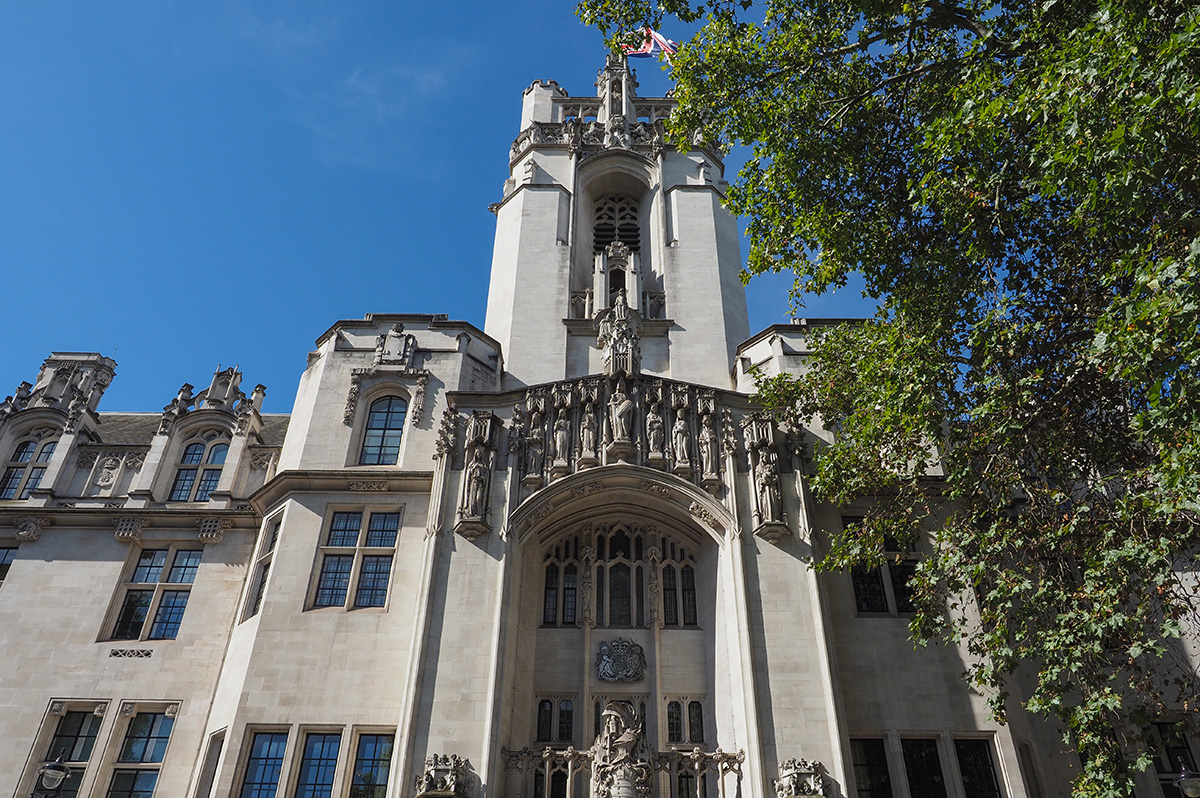News
Obama ‘blindsided’ Gates over ‘Don’t Ask’ repeal
Former HRC president says defense chief ‘somewhat disingenuous’ in new book


Defense Secretary Robert Gates reportedly said he was blindsided by President Obama’s announcement that he would repeal “Don’t Ask, Don’t Tell.” (Washington Blade file photo by Michael Key)
Robert Gates’ new tell-all book is stirring controversy, including among LGBT rights advocates, who are hitting back at leaked excerpts regarding “Don’t Ask, Don’t Tell” repeal.
According to a preview of “Duty” in media reports, including in the Washington Post, the former defense secretary identifies “Don’t Ask, Don’t Tell” repeal as among the issues he said he endured “continued conflict and a couple of important White House breaches of faith” over the course of 2010.
Although Gates reportedly writes he supported the decision to move toward open service, he says Obama “blindsided” him and then-Chairman of the Joint Chiefs of Staff Adm. Mike Mullen with one day’s notice that he would announce his request to repeal the law.
According to the Los Angeles Times, Gates also takes a jab at Obama by saying “Don’t Ask, Don’t Tell” repeal was among the few military issues about which the president expressed interest.
“The only military matter, apart from leaks, about which I ever sensed deep passion on his part was ‘Don’t Ask, Don’t Tell,'” Gates reportedly writes.
Based on the media outlet’s depiction of the portion of the book, it’s hard to tell what Gates is referring to by Obama’s announcement that he would move to end “Don’t Ask, Don’t Tell.” Gates may be referring to the 2010 State of the Union address in which Obama pledged to “work with Congress and our military to finally repeal the law that denies gay Americans the right to serve the country they love because of who they are.”
Nonetheless, LGBT advocates who contributed to the effort to repeal “Don’t Ask, Don’t Tell” are scratching their heads over the depiction that Gates was “blindsided” by the president’s plans.
Joe Solmonese, former president of the Human Rights Campaign, said his memory of what happened “doesn’t really square” with Gates’ reported recollection of the administration’s efforts to repeal “Don’t Ask, Don’t Tell.”
“If anything, I think they were particularly sensitive to making sure that Secretary Gates and Adm. Mullen were completely engaged in the process,” Solmonese said. “At each step along the way, my recollection, my memory, what I witnessed being part of the process was that was something they were incredibly sensitive to.”
Recalling that the Obama administration set up a 10-month study over the course of 2010 to examine the potential impact of open service, Solmonese said the administration approached repeal “with a deference toward” Gates and Mullen. They both endorsed the study when they announced it before the Senate Armed Services Committee in February 2010.
Nathaniel Frank, a political commentator who formerly worked for the University of California’s Palm Center on “Don’t Ask, Don’t Tell,” said Obama was “clear from the start” he wanted open service and it’s “hard to see” how Gates could have felt blindsided.
“The two men were doing a delicate dance over how much to prioritize repeal among many important issues, and both were under a lot of pressure to deliver,” Frank said. “I don’t know what their private conversations involved, but eventually the president came to understand that the political window for repeal was closing, and he had to move forward.”
Solmonese added he thinks Gates included in his book disparaging remarks about “Don’t Ask, Don’t Tell” repeal as part of a broader theme of disappointment with the administration. Although Solmonese said he wouldn’t speculate on Gates’ motivation, he said the former defense secretary’s claim he was “blindsided” is “somewhat disingenuous to me.”
“This was a United States senator and a candidate for president, and the president all through the first part of his term who ongoingly talked about his intention to end ‘Don’t Ask, Don’t Tell,'” Solmonese said. “Quite frankly, it was a rather long time from that particular moment, if that’s what he’s talking about, until we actually ended ‘Don’t Ask, Don’t Tell.'”
But not all LGBT advocates who worked on the transition to open service share the same view.
Jarrod Chlapowski, who worked on “Don’t Ask, Don’t Tell” as part of HRC and the now-defunct Servicemembers United, said “it’s possible” Gates didn’t expect repeal would happen because there was a question over whether open service or the Employment Non-Discrimination Act would be a priority for the LGBT movement.
“There are a number of events prior to that which indicated that DADT was sexier than ENDA: Patrick Murphy’s push in the House (coordinated with Voices of Honor), the rise of Dan Choi, the standing ovation during the HRC dinner in 2009,” Chlapowski said. “I remember talking to David Smith the next day who was absolutely shocked that DADT resonated so strongly among HRC’s major donors, and you can bet that shock was shared by the administration.”
Chlapowski said the “sudden announcement” that Gates recalled would be consistent with the sudden change in priorities for the LGBT groups.
“So the narrative that the administration worked closely with Gates on a long-term strategy only to pull out the rug from under Gates jibes with the sudden recalibration of the entire gay rights movement at roughly the same time,” Chlapowski said.
The White House didn’t immediately respond to a request for comment on Gates’ remarks regarding “Don’t Ask, Don’t Tell.”
Even after Congress voted to repeal “Don’t Ask, Don’t Tell” and the president signed the repeal measure in December 2010, Obama, Gates and Mullen waited nine months to formally lift the ban in September 2011. Over the course of that time, military officials engaged with troops to prepare for the change in law, saying their duties wouldn’t change with open service.
Winnie Stachelberg, vice president of external affairs at the Center for American Progress, said she won’t comment on Gates’ recollection because she wasn’t part of his discussions. However, she said whatever the challenges in getting there, the end result to open service was seamless.
“Regardless of one’s memory, I think it’s important to note that the president and the administration were firmly committed, and that the process took some challenging turns, but the end result speaks for itself,” Stachelberg said. “Repeal of ‘Don’t Ask, Don’t Tell’ was a success and the concerns about undermining readiness and unit cohesion and retention never materialized.”
U.S. Military/Pentagon
Pentagon urged to reverse Naval Academy book ban
Hundreds of titles discussing race, gender, and sexuality pulled from library shelves

Lambda Legal and the Legal Defense Fund issued a letter on Tuesday urging U.S. Defense Secretary Pete Hegseth to reverse course on a policy that led to the removal of 381 books from the Nimitz Library of the U.S. Naval Academy in Annapolis, Md.
Pursuant to President Donald Trump’s executive order 14190, “Ending Radical Indoctrination in K-12 Schooling,” the institution screened 900 titles to identify works promoting “diversity, equity, and inclusion,” removing those that concerned or touched upon “topics pertaining to the experiences of people of color, especially Black people, and/or LGBTQ people,” according to a press release from the civil rights organizations.
These included “I Know Why the Caged Bird Sings” by Maya Angelou, “Stone Fruit” by Lee Lai, “The Hate U Give” by Angie Thomas, “Lies My Teacher Told Me: Everything Your American History Textbook Got Wrong” by James W. Loewen, “Gender Queer: A Memoir” by Maia Kobabe, and “Democracy in Black: How Race Still Enslaves the American Soul” by Eddie S. Glaude, Jr.
The groups further noted that “the collection retained other books with messages and themes that privilege certain races and religions over others, including ‘The Clansman: A Historical Romance of the Ku Klux Klan’ by Thomas Dixon, Jr., ‘Mein Kampf’ by Adolf Hitler, and ‘Heart of Darkness’ by Joseph Conrad.
In their letter, Lambda Legal and LDF argued the books must be returned to circulation to preserve the “constitutional rights” of cadets at the institution, warning of the “danger” that comes with “censoring materials based on viewpoints disfavored by the current administration.”
“Such censorship is especially dangerous in an educational setting, where critical inquiry, intellectual diversity, and exposure to a wide array of perspectives are necessary to educate future citizen-leaders,” Lambda Legal Chief Legal Officer Jennifer C. Pizer and LDF Director of Strategic Initiatives Jin Hee Lee said in the press release.
Federal Government
White House sues Maine for refusing to comply with trans athlete ban
Lawsuit follows months-long conflict over school sports in state

The Justice Department is suing the state of Maine for refusing to comply with President Donald Trump’s executive order banning transgender athletes from participating in school sports, U.S. Attorney General Pam Bondi announced on Wednesday.
DOJ’s lawsuit accuses the state of violating Title IX rules barring sex discrimination, arguing that girls and women are disadvantaged in sports and deprived of opportunities like scholarships when they must compete against natal males, an interpretation of the statute that reverses course from how the law was enforced under the Biden-Harris administration.
“We tried to get Maine to comply” before filing the complaint, Bondi said during a news conference. She added the department is asking the court to “have the titles return to the young women who rightfully won these sports” and may also retroactively pull federal funding to the state for refusing to comply with the ban in the past.
Earlier this year, the attorney general sent letters to Maine, California, and Minnesota warning the blue states that the department “does not tolerate state officials who ignore federal law.”
According to the Maine Principals’ Association, only two trans high school-aged girls are competing statewide this year. Conclusions from research on the athletic performance of trans athletes vis-a-vis their cisgender counterparts have been mixed.
Trump critics and LGBTQ advocates maintain that efforts to enforce the ban can facilitate invasive gender policing to settle questions about an individual athlete’s birth sex, which puts all girls and women at risk. Others believe determinations about eligibility should be made not by the federal government but by school districts, states, and athletics associations.
Bondi’s announcement marked the latest escalation of a months-long feud between Trump and Maine, which began in February when the state’s Democratic governor, Janet Mills, declined to say she would enforce the ban.
Also on Wednesday, U.S. Education Secretary Linda McMahon said the findings from her department’s Title IX investigation into Maine schools — which, likewise, concerned their inclusion of trans student-athletes in competitive sports — was referred to DOJ.
Earlier this month, the Justice Department pulled $1.5 million in grants for Maine’s Department of Corrections because a trans woman was placed in a women’s correctional facility in violation of a different anti-trans executive order, while the U.S. Department of Agriculture paused the disbursement of funds supporting education programs in the state over its failure to comply with Title IX rules.
A federal court last week ordered USDA to unfreeze the money in a ruling that prohibits the agency from “terminating, freezing, or otherwise interfering with the state’s access to federal funds based on alleged Title IX violations without following the process required by federal statute.”
United Kingdom
UK Supreme Court rules legal definition of woman limited to ‘biological women’
Advocacy groups say decision is serious setback for transgender rights

The British Supreme Court on Wednesday ruled the legal definition of a woman is limited to “biological women” and does not include transgender women.
The Equality Act that bans discrimination based on sexual orientation and gender identity took effect in 2010.
Scottish MPs in 2018 passed a bill that sought to increase the number of women on government boards. The Supreme Court ruling notes For Women Scotland — a “feminist voluntary organization which campaigns to strengthen women’s rights and children’s rights in Scotland” — challenged the Scottish government’s decision to include trans women with a Gender Recognition Certificate in its definition of women when it implemented the quota.
Stonewall U.K., a British advocacy group, notes a Gender Recognition Certificate is “a document that allows some trans men and trans women to have the right gender on their birth certificate.”
“We conclude that the guidance issued by the Scottish government is incorrect,” reads the Supreme Court ruling. “A person with a GRC (Gender Recognition Certificate) in the female gender does not come within the definition of ‘woman’ for the purposes of sex discrimination in section 11 of the EA (Equality Act) 2010. That in turn means that the definition of ‘woman’ in section 2 of the 2018 Act, which Scottish ministers accept must bear the same meaning as the term ‘woman’ in section 11 and section 212 of the EA 2010, is limited to biological women and does not include trans women with a GRC.”
The 88-page ruling says trans people “are protected by the indirect discrimination provisions” of the Equality Act, regardless of whether they have a Gender Recognition Certificate.
“Transgender people are also protected from indirect discrimination where they are put at a particular disadvantage which they share with members of their biological sex,” it adds.
Susan Smith, co-founder of For Women Scotland, praised the decision.
“Today the judges have said what we always believed to be the case, that women are protected by their biological sex,” she said, according to the BBC. “Sex is real and women can now feel safe that services and spaces designated for women are for women and we are enormously grateful to the Supreme Court for this ruling.”
Author J.K. Rowling on X said it “took three extraordinary, tenacious Scottish women with an army behind them to get this case heard by the Supreme Court.”
“In winning, they’ve protected the rights of women and girls across the UK,” she added.
It took three extraordinary, tenacious Scottish women with an army behind them to get this case heard by the Supreme Court and, in winning, they’ve protected the rights of women and girls across the UK. @ForWomenScot, I’m so proud to know you 🏴💜🏴💚🏴🤍🏴 https://t.co/JEvcScVVGS
— J.K. Rowling (@jk_rowling) April 16, 2025
Advocacy groups in Scotland and across the U.K. said the ruling is a serious setback for trans rights.
“We are really shocked by today’s Supreme Court decision — which reverses 20 years of understanding on how the law recognizes trans men and women with Gender Recognition Certificates,” said Scottish Trans and the Equality Network in a statement posted to Instagram. “The judgment seems to have totally missed what matters to trans people — that we are able to live our lives, and be recognized, in line with who we truly are.”
Consortium, a network of more than 700 LGBTQ and intersex rights groups from across the U.K., in their own statement said it is “deeply concerned at the widespread, harmful implications of today’s Supreme Court ruling.”
“As LGBT+ organizations across the country, we stand in solidarity with trans, intersex and nonbinary folk as we navigate from here,” said Consortium.
The Supreme Court said its decision can be appealed.
-

 The White House5 days ago
The White House5 days agoWhite House does not ‘respond’ to reporters’ requests with pronouns included
-

 District of Columbia2 days ago
District of Columbia2 days agoReenactment of 1965 gay rights protest at White House set for April 17
-

 Hungary2 days ago
Hungary2 days agoHungarian MPs amend constitution to ban public LGBTQ events
-

 Maryland2 days ago
Maryland2 days agoFreeState Justice: Transgender activist ‘hijacked’ Moore’s Transgender Day of Visibility event












